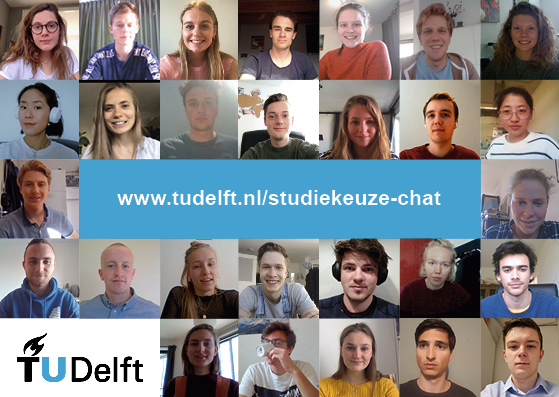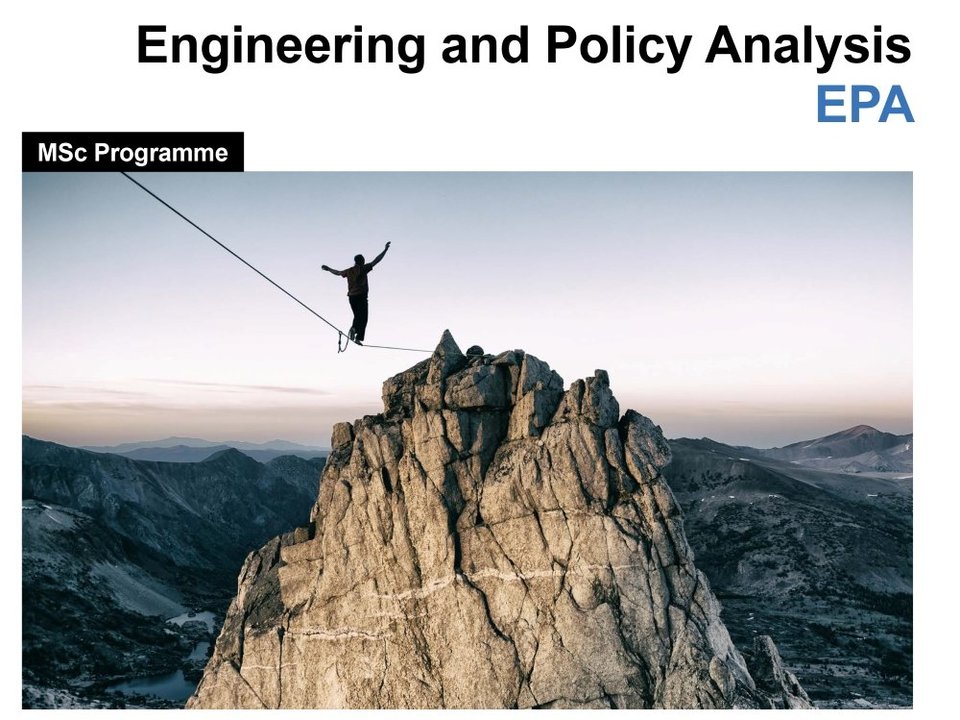MSc Engineering and Policy Analysis
Do you want to work on real life cases together with governments, NGO’s and multinationals focussing on the interaction between nature, society and technology? Be part of an international student community with students from various engineering backgrounds, at the highest ranked Dutch University of Technology? Study in the middle of the Central Innovation District in The Hague, home to the Dutch government, at the Campus The Hague of TU Delft? Work with cutting-edge modelling tools that prepare you for the field work and enjoy excellent job prospects after graduation? Then register for the MSc programme Engineering and Policy Analysis (EPA).
Degree: Master of Science Engineering and Policy Analysis
Credits: 120 ECTS, 24 months, full time
Accreditation: Accredited by NVAO
Starts in: September
Language: English
Location: The first year of EPA is taught in the city of The Hague. The second year will be taught partly in Delft.
Application deadline: April 1st (International), May 1st (Dutch)
Scholarships: Tuition free scholarships available
What you will learn
The central focus is on analysing and solving complex problems that involve many parties with conflicting interests. The fundamental themes of the EPA programme are system understanding, modelling, simulation, policy and politics. Complex problems require solutions that not only address technology, but also societal and political aspects. This requires knowledge about policymaking, ethics and economics. . As a student, you will work on real and actual cases, such as the energy crisis, the impact of AI on society and urbanisation, often with the real commissioner of the work at arm’s length. Also, climate change policy adaption is a topic commonly analysed through EPA lenses: which policies would be feasible in specific contexts, which policies are robust to major changes, and how can different societies adapt to it in better ways?
The core contents of the EPA programme are:
-
What are the international grand challenges for the coming decennia? Water, Energy, Food, Health, Safety and Security issues, Development, Cyber Security. Solving the Grand Challenges requires your technical knowhow and engineering DNA: an analytical skill set, comfortable with data, and fascinated by technology. The EPA master challenges your engineering skills and engineering DNA to analyse, model and design solutions to these grand challenges.
-
The international grand challenges are complex, because they involve multiple organizations and factors that interact with each other. As such they are systematic. To improve policymaking about these challenges you need to understand systems, which are all relevant organizations and factors as well as their interactions. Systems have important technological components, but also political, ethical and economic components.
-
If you want to have impact in the real world, you need leadership and management skills. You need to understand how the game of decision-making is being played: what strategies and tactics are used, how government and industry try to influence each other, how the public perception is being shaped. EPA teaches you socio-political skills with real-life cases.
-
To support informed decision-making, data analytics and cutting edge modelling techniques are valuable tools. You will be introduced to different modelling and simulation paradigms, which support long-term decision-making on complex societal issues. You will become a proficient user of these techniques and will work with up to date computer programmes which are used in the work field. Therefore, skills on programming (especially with Python) are highly recommended.
-
Future engineers will be working in a diverse and international environment. EPA is an international oriented programme and attracts students from a wide range of countries thus forming the ideal starting ground for an international career.
Interdisciplinary approach
At the heart of the EPA programme lays an interdisciplinary approach.
The EPA programme is broader than (monodisciplinary) engineering studies such as chemical, mechanical, or software engineering. This makes the EPA programme an interesting - but at the same time complicated - field of study and work. The EPA modules therefore are prepared and taught by staff from a wide range of disciplines: mathematicians, technologists, economists, lawyers and social scientists.
We strongly believe that student performance is not only influenced by the quality of our education but also by EPA community building – both between students and between students and staff. Staff organizes an introduction week, regular get-togethers and an annual thesis conference. There is also a very active student body organizing dinners, career events, lectures., and much more. To find out more about the students and their projects, please have a look at the EPA student stories page.



